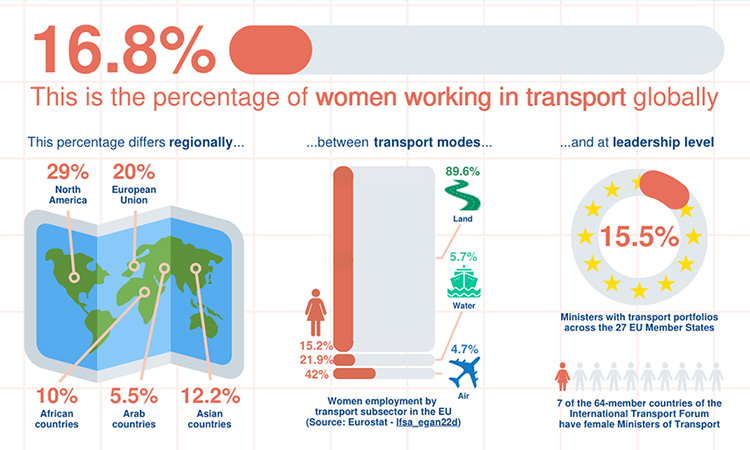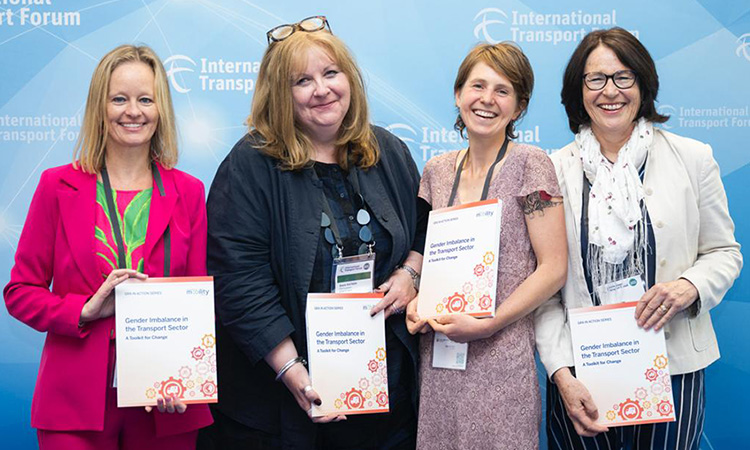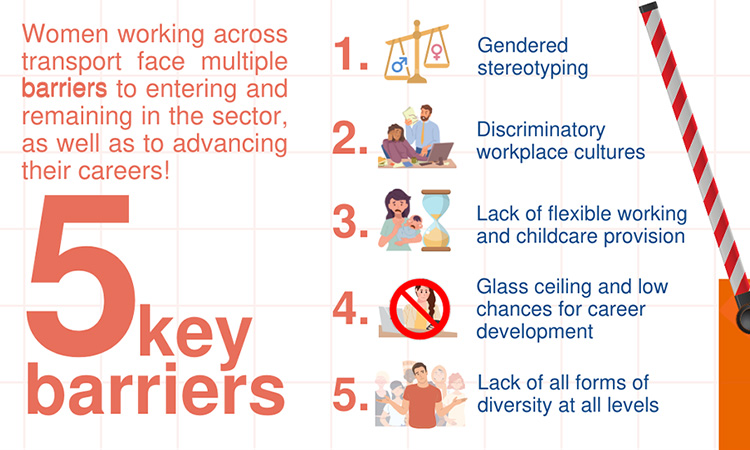Tackling the gender imbalance in transport: Time is of the essence
- Like
- Digg
- Del
- Tumblr
- VKontakte
- Buffer
- Love This
- Odnoklassniki
- Meneame
- Blogger
- Amazon
- Yahoo Mail
- Gmail
- AOL
- Newsvine
- HackerNews
- Evernote
- MySpace
- Mail.ru
- Viadeo
- Line
- Comments
- Yummly
- SMS
- Viber
- Telegram
- Subscribe
- Skype
- Facebook Messenger
- Kakao
- LiveJournal
- Yammer
- Edgar
- Fintel
- Mix
- Instapaper
- Copy Link
Posted: 6 July 2023 | Isobel Duxfield - POLIS Network | No comments yet
POLIS Network’s Isobel Duxfield discusses the importance of collective action and immediate measures to address the gender disparity in the transport sector, highlighting SuM4All’s gender imbalance toolkit as a valuable resource for driving change and promoting inclusivity.


Transport has a gender diversity problem. According to the International Labour Organization’s latest figures, women make up just 16.8% of those working in transport globally.
According to the International Labour Organization’s latest figures, women make up just 16.8% of those working in transport globally”
This makes it one of the worst performing industries worldwide – across both the public and private sectors, from boardroom to engine room. Just seven of the 64-member countries of the International Transport Forum (ITF) countries have female Ministers of Transport.
When the United Nations (UN) released their 2023 figures on the share of women holding cabinet portfolios, transport came second to last – second only to religion. Meanwhile, less than 3% of truck drivers were women in 2021. According to IRU figures, just 12% of bus and coach driving positions in Europe are occupied by women.
The scale of the issue was laid bare in May 2023, when POLIS and the FIA Foundation released the ‘Gender imbalance in the transport sector: A toolkit for change’ report. The report reveals the entire sector’s devastating lack of workplace diversity globally, and warns of the perils of failing to address the situation head on.
The work has been produced as part of SuM4All’S Gender working group, a consortium of organisations working across the transport sector, including POLIS, FIA Foundation, Walk-21, MySafetyPin, the International Transport Forum and others.
“The working group had already published work on practical changes with South Africa as a case study, but we knew that we needed to take action on the sector’s own gender inequality,” said Sheila Watson, Deputy Director of the FIA Foundation, working group Co-Chair and toolkit co-ordinator.


Credit: POLIS Network
Collaborative efforts and action
Thus, the Foundation partnered with POLIS – who has been working alongside several local and regional policymakers on gender equality, LGBTQIA+ rights, physical accessibility of services and more – as well as Heather Allen, an independent consultant who has many years’ experience working on gender and mobility across the globe.
“This is the first piece of work to date which takes such a global and cross-modal approach,” said co-author, Heather Allen.
The report has arrived at a pivotal time for the transport sector. Digitalisation and automation are transforming working practices, an accelerating climate emergency prompts the urgency for more sustainable practices, and skills and labour shortages persist.
Yet, the sector’s gender imbalance is severely obstructing its capacity to face these challenges.
While, for many, transport’s focus on gender equality may be somewhat new, the FIA Foundation has in fact been working on this topic for over a decade.
“The central role of fair access in delivering sustainable mobility is an important rationale for the foundation and it has supported work across the field for many years. The impetus for work on gender, specifically, was the appalling murder of a young woman using shared mobility in India some years ago,” said Watson.
Indeed, this led the Foundation to conduct a project examining the issues around safety and security on public transport with CAF – the Latin American development bank – and a wide range of further work has followed, ranging from the impact of poor mobility options on access to sexual and reproductive health services in Africa, to the need for better data collection to ensure that gender disaggregated data is available in transport planning.
“A few years ago, we worked with the Latin American development bank, Elle se mueve sugura (She moves safely), which led to real changes in transport planning in the region,” notes Watson.
Before this study, transport professionals tended to assume that the harassment was associated with poor quality transport and, therefore, it would disappear once the service quality improved”
This tested an innovative methodology to collect data on sexual harassment in three Latin American cities (Buenos Aires, Quito and Santiago). The project worked with three local research teams and helped to build research capacity and understanding about the daily experiences of women who encounter sexual harassment in the region.
“Before this study, transport professionals tended to assume that the harassment was associated with poor quality transport and, therefore, it would disappear once the service quality improved,” said Allen.
Now, there are a growing number of global studies shaping change.
“I have actively been working on gender and mobility since 2015, and I have seen some positive changes over the last few years. Back then, the conversations about gender were quite niche and superficial, but today you cannot go to a transport conference without gender appearing somewhere on the programme,” said Allen.
“I particularly like the SHE CAN tool that was developed for African Cities as part of the EMPOWER project,” Allen continues. “This is an internet-based diagnostic tool that can be used by cities to help them to collect disaggregated data and provides them with a menu of actions and interventions that they can tailor to their local contexts.”


Credit: FIA Foundation
Turning the lens on the sector
However, for the FIA Foundation, POLIS and other members of the SuM4All Gender working group, it became transparent that the transport sector would not be able to tackle women’s marginalisation from mobility services without turning the lens on itself and examining its own diversity problem.
Inclusive transport services cannot be delivered without a more diverse workforce. We need to be able to reflect and represent who we seek to serve”
“Inclusive transport services cannot be delivered without a more diverse workforce. We need to be able to reflect and represent who we seek to serve and, at present, the transport workforce is far from achieving this much-needed diversity,” said Karen Vancluysen, POLIS’ Secretary General.
From the ITF and UITP Positive Employer Gender Policy, to the IRU’s driver shortage report and the World Bank’s The ABCs of the Role of Public Transport in Women’s Economic Empowerment, the toolkit follows growing calls for action. Aviation, maritime, automotive, shared mobility and public transport are sectors where leading transport bodies are placing gender higher on the agenda than ever before.
Yet, despite slowly growing attention, Watson warns of the significant challenges which still lie ahead, and the need to begin treating gender imbalance with more urgency.
“I think there has been some progress, most notably in terms of some regulations and voluntary schemes which are outlined in our recent report with POLIS and SuM4All. However, as someone with a few years on the clock in the sector, I have to say that raising the issue of equal employment opportunity sadly still elicits some of the same defensive and tired responses, which it did when I began work many years ago. That is disappointing,” she said.
This is not just anecdotal. Between 2013 and 2023, there was less than 3% improvement in the volume of women employed in the sector. Recent national and international policy agendas have attempted to bridge this gap, but impacts on the ground have been slower to transpire.
I am reminded of a placard I saw at a rally for women’s rights in America recently, which was held aloft by an older woman, and said, “I can’t believe I still have to argue for this stuff!”


Credit: POLIS Network
Urgency is growing
This is a lethargy that transport can ill afford. Transport faces significant skills and labour shortages worldwide. The rail, trucking and coach sectors, in particular, are grappling with a crippling lack of workers, with current employees requiring upskilling and re-skilling; globally, 2.6 million truck driver jobs were unfilled in 2021, while in the UK, it is estimated that 80% of the rail industry will require training over the next two decades to contend with modernising technologies.
Armed with a comprehensive toolkit for action, the report provides all of the information and advice that any organisation in the transport sector may need to bridge their gender gap”
However, the toolkit seeks to do more than simply reflect on the current situation. Armed with a comprehensive toolkit for action, the report provides all of the information and advice that any organisation in the transport sector may need to bridge their gender gap. It highlights that transformative action is, in fact, underway across the globe – actions which hold lessons and transferable solutions for others.
“While this study is a stark reminder of the immense progress still to be made, it also demonstrates that we do not need to reinvent the wheel,” notes Vancluysen.
Watson echoes this sentiment, “Now is the hour for action, the report itself provides practical case study examples of changes that have been made and could be made by others and so is a real contribution to supporting change in the sector.”
This practical approach reflects POLIS and the FIA Foundation’s commitment to translating dialogue into action.
“It is a key part of our advocacy model to use powerful evidence and practical solutions, such as those within this report, and the foundation has been actively engaged in promoting the work this far and will continue to do that,” Watson continues.
From Kochi Metro to LA Metro, Stagecoach to EMT Madrid, Tesla to UPS; the toolkit examines a range of approaches to gender inclusive recruitment, retention and career progression, exploring how they were established and scaled up and critically, the difficulties faced in these processes.
While case studies provide clear and detailed recommendations – even blueprints – for actions that the sector can take, a large part of this report is documenting the lived experiences of women working in the sector. As every good human resources professional knows, career decisions and workplace experiences are shaped by emotions, communication and relationships.
“We need to fully understand how these barriers are experienced, in order to prescribe action. It is about first listening,” said Allen.
Indeed, the narration of these lived experiences is critical to understanding the gaps in existing policy frameworks. From childcare to apprenticeship opportunities, the research reveals how, despite progress in policy – on international, national and local levels – they have failed to transform women’s access to employment opportunities and ability to combine unpaid care, labour and career advancement.
Where do we go from here?
The research is a call for employers, unions, academics and civil society to treat transport’s gender imbalance with renewed urgency, listening to concerns and understanding where barriers remain within their organisation.
“I hope results can be used to motivate others to address the gender imbalance more actively and help drive changes in the workforce that will benefit women, but also everyone,” concluded Allen.


Related topics
Passenger Experience, Public Transport, Workforce Inclusivity, Workplace
Related modes
Bus & Coach, Rail
Related cities
Buenos Aires, Kochi, Madrid, Quito, Santiago
Related organisations
FIA Foundation, POLIS Network, Sustainable Mobility for All (SuM4All)
Related people
Heather Allen, Isobel Duxfield, Karen Vancluysen, Sheila Watson








